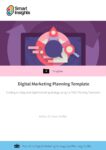4IR means manufacturers are using technology and digital marketing techniques to streamline their marketing strategy
We are living and working in the 4th industrial revolution where increased competition coupled with changing customer expectations translates into a renewed focus on digital marketing for manufacturers. To keep up, manufacturing businesses need to optimize their approach to digital to stand out and defend their market share.
How does the digital era influence marketing for manufacturing?
According to Mckinsey, digital transformations are 'long-term efforts to rewire how an organization continuously improves and changes'.
This generic definition is true for all industries but it's particularly prominent in the manufacturing industry right now. For example, this PwC survey of oil and gas executives reported that manufacturing leaders see the most potential in technologies that combine data and analysis.
In this insightful report, PwC outlined a framework for digital transformation within the sector. This demonstrates that digital and AI capabilities have the power to completely revolutionize the manufacturing industry we know today.
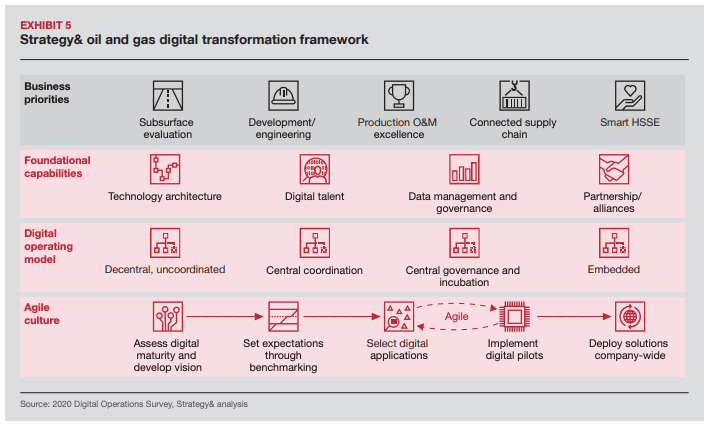
So what does this mean for marketers in the manufacturing industry?
2024 brings ever-before-seen access to granular data, in real-time, which marketers can tap into for:
- Strategic insight into supply and demand - to influence partnerships, pricing, and promotion
- Market data and feedback - to inform positioning and development
- Improved international working relationships
- Always on digital marketing channel and platform optimization
- Workload and priority management
Sounds great, doesn't it? But, with avenues opening up for innovation in marketing, manufacturing leaders know the best way to take advantage of these opportunities is through a clear, forward-looking marketing strategy. That's why we recommend utilizing a RACE-centric strategy to make it happen.
The RACE Framework empowers data-driven digital marketing for manufacturers
We recommend the RACE Framework for manufacturers looking to streamline their marketing strategy. This step-by-step process supports manufacturing marketers and managers in implementing industry data and best practices across all customer touchpoints.
By defining objectives and KPIs across each stage of the customer journey, you can track your marketing across the reach, act, convert, and engage stages of their lifecycle. The RACE Framework enables manufacturing marketers to optimize their marketing strategy to drive the results they need to achieve their goals.
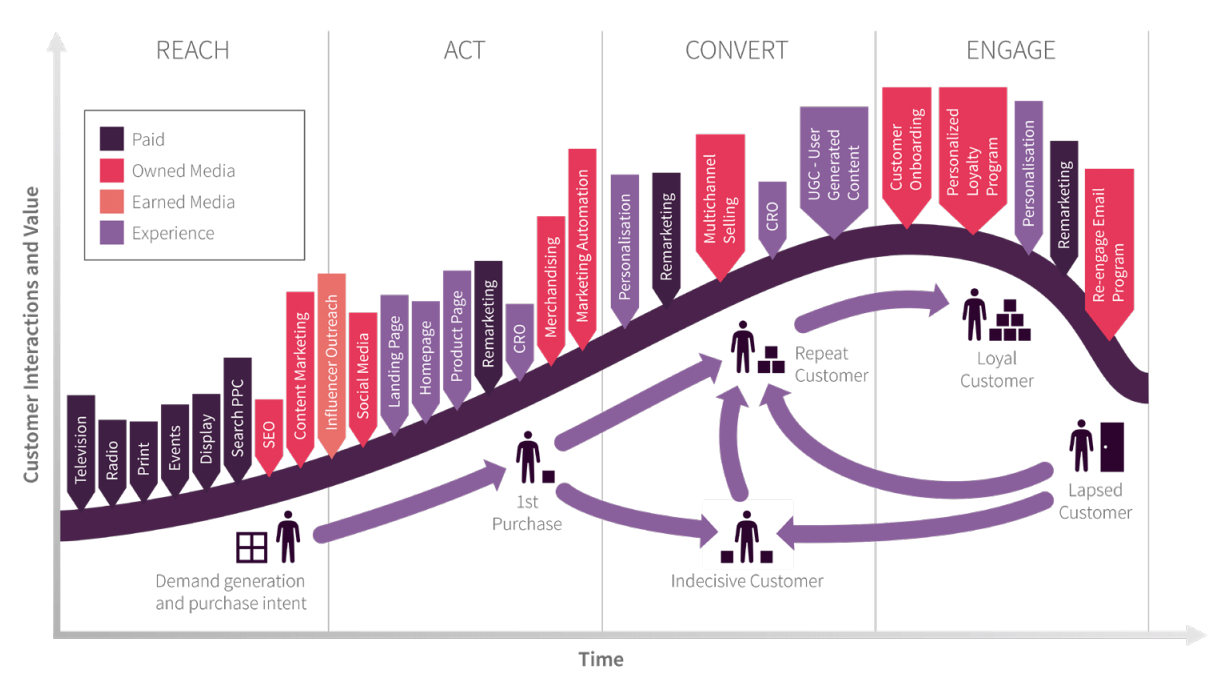
In this blog, we will look at some of the opportunities for manufacturing businesses in the fourth industrial revolution. Structured across RACE, we will share our strategic recommendations for marketers to achieve their objectives at each stage of the customer lifecycle. Don't forget to download your free RACE digital marketing planning template too.
Free digital marketing plan template
Our popular marketing planning template is structured across the Smart Insights RACE Framework. Join Smart Insights as a Free Member to download our digital marketing plan template today
Access the Free digital marketing plan template
Reach: Strategic paid search engine marketing
Of course, there's a time and a place to build your organic search traffic. For some manufacturers, this is a huge source of income. If you're already operating online, it's likely you already have an organic strategy in place. If you haven't, you will want to use SEO Learning Path modules such as a planned approach to SEO, to capitalize on this channel. But now, let's turn to paid advertising as a strategy to help accelerate the ROI of your digital marketing for manufacturing.
In the age of digital disruption, it will be beneficial to also pay attention to your use of paid media. Search ads allow marketers to apply a hyper-targeted approach to their reach strategy, so you can use marketing data to reach the right customers, keep your costs down. As we know, decision-makers and purchasing managers use search engines to research your product. So, manufacturing digital marketers must assign their budgets to high-intent keywords, to get their key messages in front of the right people, at the right time.
This is where paid advertising for manufacturing really comes into its own. Since, in this industry, product specifications are a crucial factor in getting the right product. For example, using the everyday product 'paper', savvy manufacturing marketers know that in addition to this single-word search term, you will want to compete on longer-tail searches based on specific features:
- Lasercut
- GSM
- Recycled
- International paper size
- Inkjet
- Delivery time
Since you have control over your messaging for each search term, you must ensure the ad returned to the user answers their question, to encourage that all-important click, and get value for money on your paid activity. Crucially, if you can't offer the user what they're searching for, don't pay to advertise on that search term! This creates a terrible user experience, and, decreases your Google quality score, costing you more money per click.
The graph below details the search demand curve, taken from our select search marketing investments module in the RACE Digital Practical Strategy Learning Path. As you can see, you will quickly identify a few highly popular searches as well as a long tail of 'unpopular' searches. Digital marketers for manufacturing businesses with a modest budget can use our tools and templates to prioritize their investments by positioning, market share, and competition.
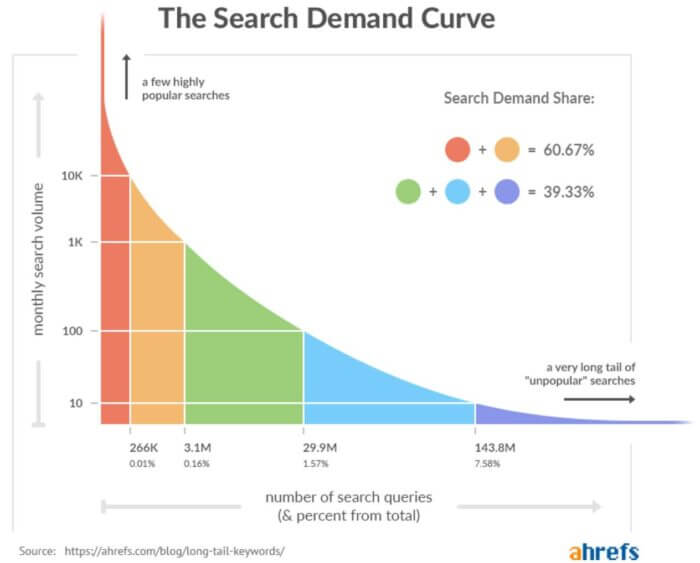
Importantly, paid ads allow geo-targeting. So make sure you're only paying to advertise your products in locations you can comfortably and profitably serve. Too much product in one location? Flash sale. Shortages in another? Pause the ads. Whether you set up automated or manual processes to track your stock, make sure you have the conversation before increasing your budget.
You can find these options in the left-hand side menu for your Google Ads account. Targeted locations can be turned on and off with the touch of a button. So you've got no excuses for wasting money on locations, or products, that won't win you customers.
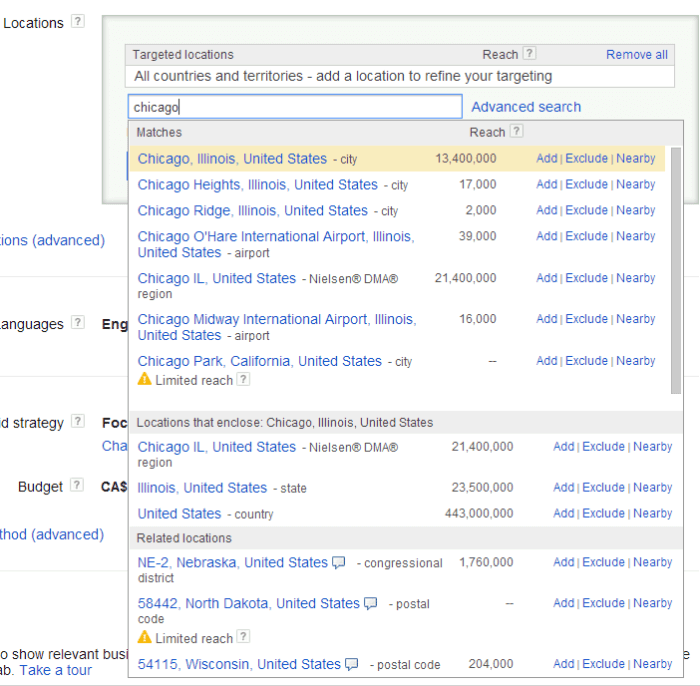
Paid search marketing is just one example of numerous strategies manufacturing marketers can implement to increase their reach. Our RACE Practical Digital Strategy Learning Path covers paid and organic (mentioned above), plus earned media, influencers, partnerships and acquisition planning.
Interact: Content marketing
Once you've got your customer onto your webpage, now is time to delight them with content that will keep them interacting with you. Content Marketing Institute reported in their manufacturing content marketing 2023 insights that last year manufacturing marketers used videos, short articles, and infographics as their top 3 content types.
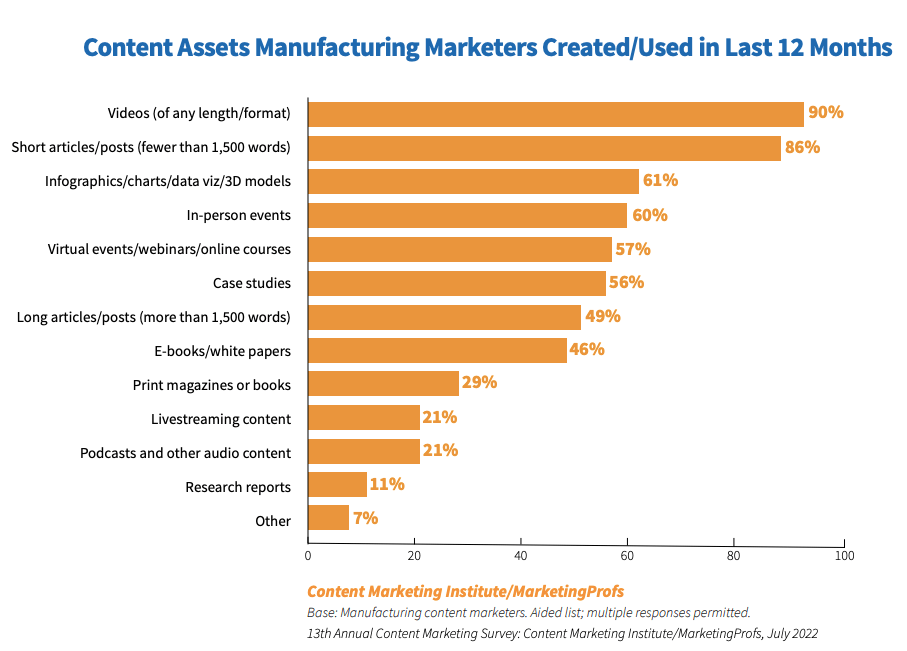
Your marketing content will, of course, depend on your objectives. By integrating your content marketing outputs within the RACE Framework, you can make sure your great content is working hard for your strategy.
Smart Insights members are utilizing our content marketing tools and templates, such as the blog editorial planner in our Content Marketing Learning Path. Here you can see the 4 different types of blogs that could be planned to support increasing subscribers to your manufacturing business.
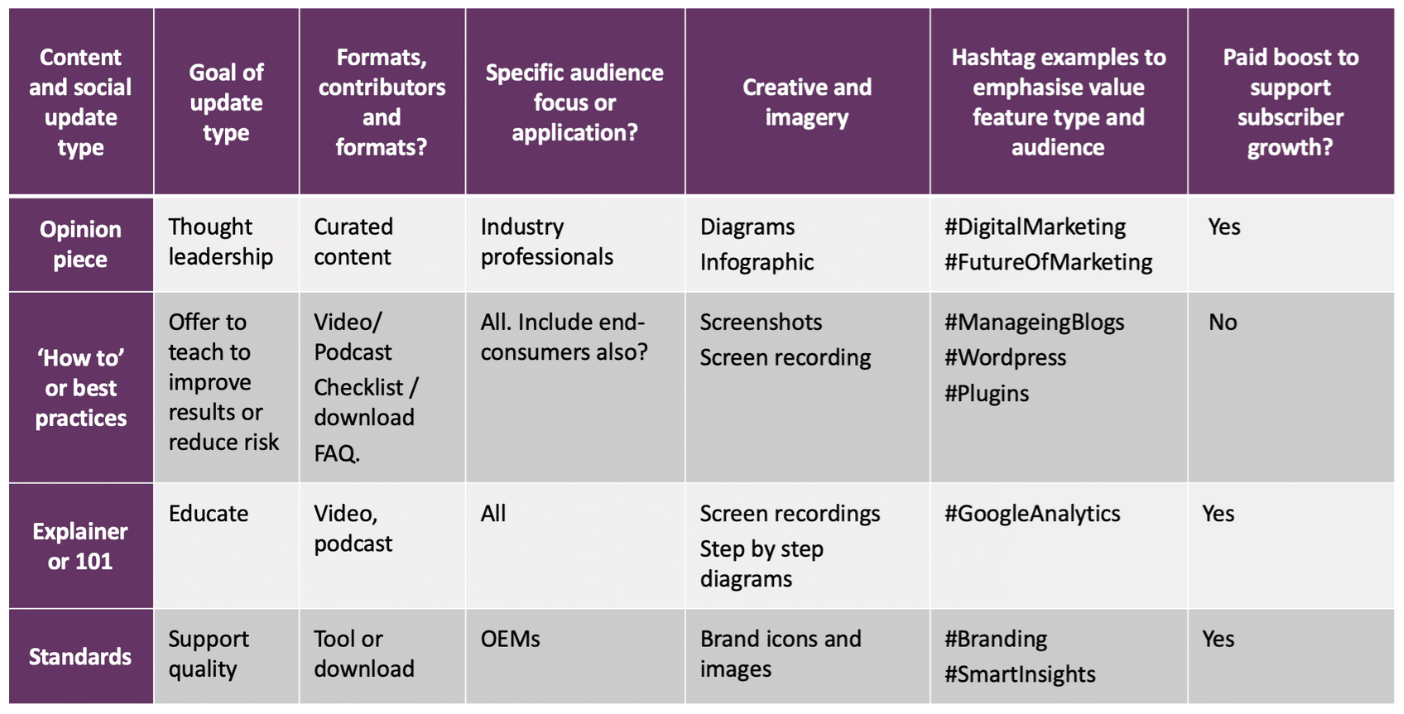
Our content resources and all our marketing solutions are integrated across the RACE Framework, so you can optimize your manufacturing marketing strategy at each stage of the customer journey.
Convert: Lead profiling and prioritizing
You will find that some content supports higher quality lead-gen than others. It's important for sales and marketing to have those conversations to keep the funnel as efficient as possible. Here, you can use the RACE Framework to track those customer journeys and dial up the type of lead generation that drives conversion.
Moreover, you will always find that some prospects are more promising than others. Manufacturing sales and marketing teams need to use customer and product data to prioritize accordingly. We have marketing tools and templates to support you in putting these processes in place.
One very simple matrix, which is a great starting point if you're not already lead profiling, is the fit vs interest matrix below. This matrix, from our RACE Practical Digital Strategy Learning Path, demonstrates 4 quick categories to help you prioritize your leads.
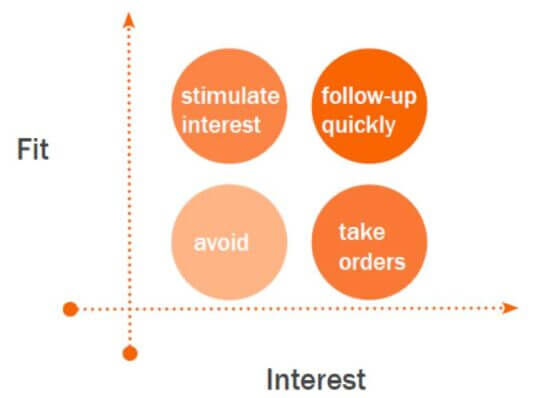
Naturally, you will want to follow up quickly with prospects who are a good fit for your product and have expressed an interest, as this group is the most likely to convert. Through digital transformation, such as the processes we explored above, you can equip your marketing and sales team with real-time data to strengthen your key messages during their decision-making.
We recommend an omnichannel approach to customer conversion. The diagram below, from our multichannel selling module in the RACE Practical Digital Strategy Learning Path, demonstrates online and offline decision-making. As you can see, to ensure the most effective approach to customer conversion, manufacturing marketers need to integrate online and offline marketing and sales processes.
For example, for complex purchasing decisions, your online customers may need offline assistance to help specify their decisions, and provide reassurance when they make their purchases. This process is referred to as ROPO (research online purchase offline) and is one of many omnichannel customer journeys your manufacturing business needs to cater for, in order to fully optimize your conversion strategy.
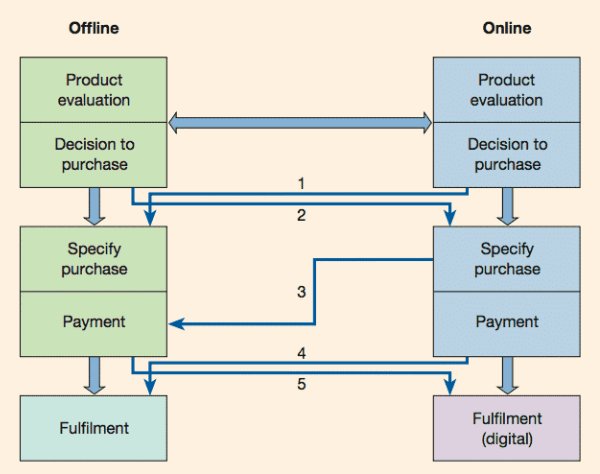
Of course, your multichannel conversion strategies will need to be tailored to your internal and external environment. But, many manufacturers find success with a conversion marketing mix including:
- Telephone
- Website personalization
- Paid display and social retargeting
- Email nurturing
Did you know, when implemented properly, email generates $36 for every $1 spent? That gives email an astounding 3,600% ROI, making it one of the most effective channels available. Start converting more customers today with our Email Marketing and Automation Learning Path, helping you create an effective and efficient email strategy for your business.
Join Smart Insights today for access to all the strategy and planning tools you need to win more customers. Implement strategic, data-driven positioning, branding, and content marketing to engage your target markets. Apply trends and best-practice to prioritize and forecast for your key channels, tactics, and KPIs, across RACE. We've got the marketing solutions to support manufacturing businesses of all shapes and sizes.
Smart Insights members also keep their customers engaged after their first purchase, we have loyalty/advocacy planning built into the funnel from the get-go. Good marketers in the manufacturing industry know the value of engaging and retaining their customers. Don't lose all the hard work you put into reach, act, and convert by letting your competitors nab your unengaged customers!
Find out more about the RACE Framework and discover how we can support your manufacturing business to win and engage more customers. Get started today.
Free digital marketing plan template
Our popular marketing planning template is structured across the Smart Insights RACE Framework. Join Smart Insights as a Free Member to download our digital marketing plan template today
Access the Free digital marketing plan template





